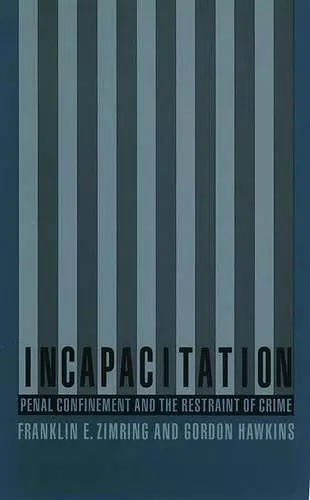Incapacitation
Penal Confinement and the Restraint of Crime
Franklin E Zimring author Gordon Hawkins author
Format:Paperback
Publisher:Oxford University Press Inc
Published:2nd Oct '97
Currently unavailable, and unfortunately no date known when it will be back

In this, the first comprehensive assessment of incapacitation, Professors Zimring and Hawkins show the increasing reliance of restraint to justify imprisonment, analyse the existing theoretical literature on incapacitation effects, review the existing empirical research on the topic, report a new study, and explore in detail the links between what is known about incapacitation and the proper construction of criminal justice policy.
"A tremendous contribution to criminology, criminal justice policy, and sentencing jurisprudence...by far the most comprehensive and trenchant analysis of incapacitation yet written. This book does for incapacitation what Zimring and Hawkins' first book did for deterrence."--James B. Jacobs, Director, Center for Research in Crime & Justice, New York University School of Law "Anyone who wants to get beyond the simplistic rhetoric of the current 'three strikes and you're out' debate, and take a serious look at what has been happening to state sentencing policies, should read this book."--Peter Greenwood, RAND "Zimring and Hawkins have over the years, together and individually, shown a remarkable ability to offer insightful, timely, and practical opinions and research. That knack is continued in Incapacitation: Penal Confinement and the Restraint of Crime."--The Criminologist "In this volume, Zimring and Hawkins bring intellectual vigor to describing the history of incapacitation as a concept, detailing previous research on incapacitation, and estimating the economic crime control and other impacts of incapacitation on the state of California. Incapacitation is an important addition to the literature for those who have concerns about the direction of American crime policy."--The IARCA Journal "Incapacitation does everything that a book on this neglected subject should do, and does it brilliantly. The authors are masters not only of penology and empirical research methods but also of economic theory and jurisprudence. Using data derived from recent increases in prison and jail populations, they skewer overly optimistic estimates of the gains of increased incarceration."--Albert W. Alschuler, University of Chicago "At a time when long imprisonment is being advanced by pundits and politicians as America's answer to its crime problem, Zimring and Hawkins offer a brilliantly conceived, sharply analytical and badly needed examination of the topic."--Jerome H. Skolnick, University of California, Berkeley "Zimring and Hawkins, two highly respected scholars, review and critique all of the evidence on the costs and benefits of prison, and tackle the toughest question of all: why hasn't the growth of prison populations reduced crime significantly? Their answer is well-reasoned and empirically informed, and should be must reading for analysts, students, and policymakers interested in crime policy."--Joan Petersilia,University of California at Irvine and former President, American Society of Criminology "An impressive contribution to American criminal policy science. Zimring and Hawkins subject to incisive analysis the largely unstated and unexamined assumptions underlying current practices of penal incarceration, and suggest a research agenda for acquiring new knowledge essential to rational criminal justice."--Francis A. Allen, University of Florida College of Law "It is a model of the kind of analysis of criminal justice policy we need. It is a rare and wonderful treat to read an account which is so fresh, so intelligent, so incisive. I only wish that everyone in politics, or everyone that votes, would read this book and think about the issues it raises."--Lawrence M. Friedman, Stanford Law School "These two prolific and insightful authors, Frank Zimring and Gordon Hawkins, have added one more excellent volume to their most impressive collection. Incapacitation should strengthen the foundation for further research and also inform policy makers and their advisors on how to look at issues of sentencing policy in terms of their incapacitative effect. As a synthesis of all the relevant issues, it represents a most valuable contribution."--Alfred Blumstein, Carnegie Mellon University "A tremendous contribution to criminology, criminal justice policy, and sentencing jurisprudence...by far the most comprehensive and trenchant analysis of incapacitation yet written. This book does for incapacitation what Zimring and Hawkins' first book did for deterrence."--James B. Jacobs, Director, Center for Research in Crime & Justice, New York University School of Law "Incapacitation is an example of outstanding academic scholarship. Its thoughtful reading and discussion should be considered mandatory for anyone interested in criminal justice policy in the United States and the role that penal incarceration will take in the future."--Journal of Sociology and Social Welfare "Zimring and Hawkins's magnificent and concise piece of scholarship examines the often hollow and usually contradictory consequences of confinement....Their reasoning is lucid, and their efforts to correlate public policy with public gain should impress readers of any political persuasion."--Choice "Anyone who wants to get beyond the simplistic rhetoric of the current 'three strikes and you're out' debate, and take a serious look at what has been happening to state sentencing policies, should read this book."--Peter Greenwood, RAND
ISBN: 9780195115833
Dimensions: 235mm x 152mm x 13mm
Weight: 290g
208 pages